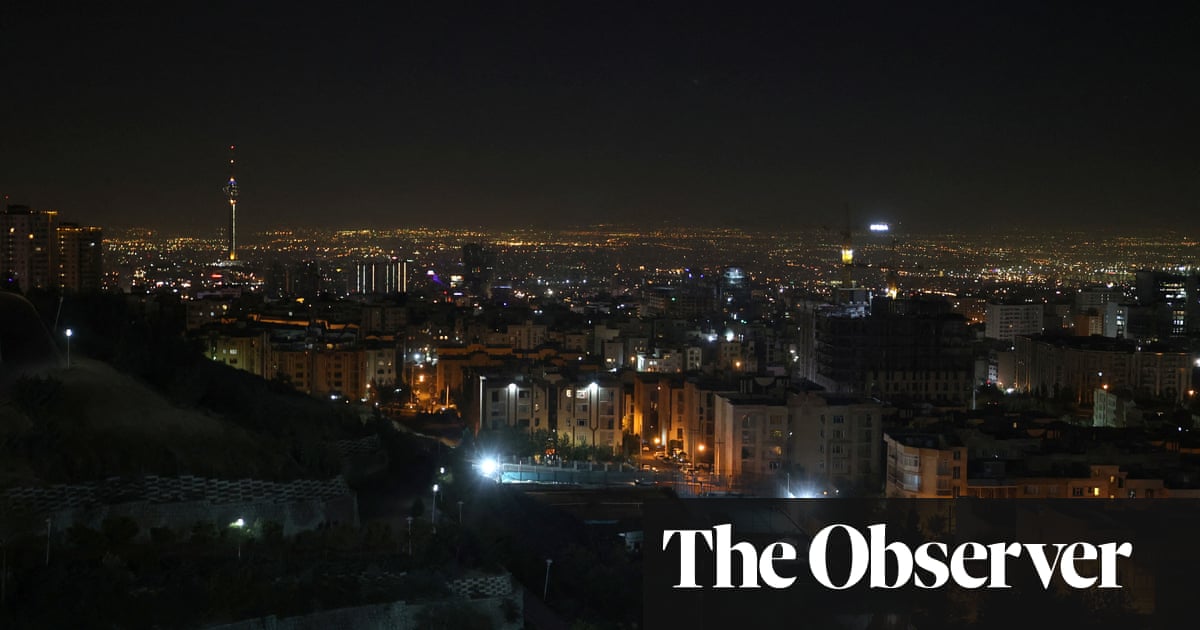For years, Israel and Iran have waged a “shadow war”, attacking each other indirectly using proxy forces, assassinations, informants, spies and hybrid, non-military covert means. Now this undeclared, largely silent war is undisguisedly out in the open. It’s become a shooting war, it’s noisy, it’s escalating, and there’s no end in sight.
This is not to say Israel’s large-scale, three-wave air assault on Tehran and other targets inside Iran early on Saturday morning means the two enemies are now engaged in all-out conflict. This is not yet the full-scale, region-wide conflagration so many in the Middle East fear. That may be coming, but it’s still in the future.
What Israel’s attack – retaliation for Iran’s 181-missile barrage earlier this month – does mean is that another psychological barrier has been passed. Before the 7 October massacres of Israelis by Iran’s ally Hamas, it was hard to imagine face-to-face military confrontation on each other’s soil. It seemed too risky. Now it is being normalised.
Ever since its 1979 Islamic revolution, Iran has volubly supported Palestinian rights and vowed to destroy Israel. It created what the Israelis call an encircling “ring of fire”, building an “axis of resistance” involving Shia militias such as Hezbollah in Lebanon, the Houthis in Yemen and groups in Iraq and Syria – as well as the Sunni Islamists of Hamas.
Ever since 7 October 2023, Israel’s hard-right government, led by Benjamin Netanyahu, has gradually, some would say intentionally, expanded the Gaza war in order to hit back at these groups – and Iran itself. Netanyahu has long viewed the encirclement, especially Hezbollah’s incessant rocket attacks and Iran’s nuclear programme, as existential threats.
Something had to give. And on 1 April this year, it did. Israel bombed Iran’s diplomatic consulate in Damascus, killing two senior generals. It claimed they had been masterminding attacks. Iran, outraged, hit back on 13 April, mounting its first direct military assault on Israeli territory. The taboo was broken.
Israel subsequently retaliated in kind, but neither side did much damage – probably deliberately. Yet the ensuing calm couldn’t last. Two devastating and humiliating Israeli assassinations, of Hamas’s political chief, Ismail Haniyeh, in Tehran in July and of Hezbollah’s leader, Hassan Nasrallah in Beirut last month, shifted the dial once again.
Iran’s supreme leader, Ayatollah Ali Khamenei, an anti-western hardliner, was a personal friend of Nasrallah – and was reportedly deeply aggrieved by his death. Khamenei also declared that Haniyeh’s killing, while he was a guest in Iran’s capital city, was an insult that could not be borne. So on 1 October, Iran launched its second, larger direct attack.
Photograph: Israel Mod/Zuma Press Wire/Rex/Shutterstock
This is the attack that Israel responded to on Saturday, after three weeks of keeping the region guessing over what it would do. There was disagreement at the highest levels. Hawks argued that Israel should use this opportunity to target Iran’s nuclear and energy facilities, even to try to eliminate Khamenei and other top leaders.
The fact that, in the event, Israel confined itself to hitting military bases, and was apparently careful to avoid civilian casualties, is being seen as a success for American diplomacy. US president Joe Biden privately pressured Netanyahu not to contribute further to the escalatory spiral. He sent his secretary of state, Antony Blinken, to Jerusalem last week to drive home the point.
Biden seems to have prevailed, this time – a rare instance, since 7 October, of Netanyahu accepting American advice. But Israel’s leader evidently still reserves the right to hit nuclear facilities and other high-value targets should Tehran retaliate yet again. And Iran’s damaged air defences may now be less able to fend off future attacks.
after newsletter promotion
Knowing this could all still spin out of control, the weekend message to Iran from the Pentagon was crystal clear: do not even think about hitting back. Cease and desist. Draw a line. That same message was repeated by Keir Starmer, UK prime minister,, speaking at the Commonwealth summit in Samoa.
“I am clear that Israel has the right to defend itself against Iranian aggression. I’m equally clear that we need to avoid further regional escalation and urge all sides to show restraint. Iran should not respond,” Starmer said. “We will continue to work with allies to de-escalate the situation.”
Two weeks away from a knife-edge presidential election in which Donald Trump is claiming Biden and his protege, Kamala Harris, are hopelessly failing to control the crisis, the US administration badly wants to calm things down. For that same reason, the Pentagon stressed US forces had not been involved in the latest Israeli strikes.
Early indications suggest Iran has got the message, that it is inclined to play down this latest round of hostilities, and that it will not return fire immediately. But there is no shortage of hawks in Tehran, too. They will press for tougher action.
As Blinken’s latest futile attempts to restart talks on a Gaza ceasefire and hostage deal showed last week, the root causes of all this corrosive enmity, violence and chronic instability remain fundamentally unaddressed. Even as Israel and Iran trade blows, so far with one hand tied behind their backs, the appalling human tragedy in Gaza continues unchecked – and, worse, is pushed out of the headlines.
And yet, unless and until Gaza and the wider Palestinian question is resolved, it is only a matter of time before the next, even more dangerous round of direct Israel-Iran fighting explodes across the face of the Middle East.

